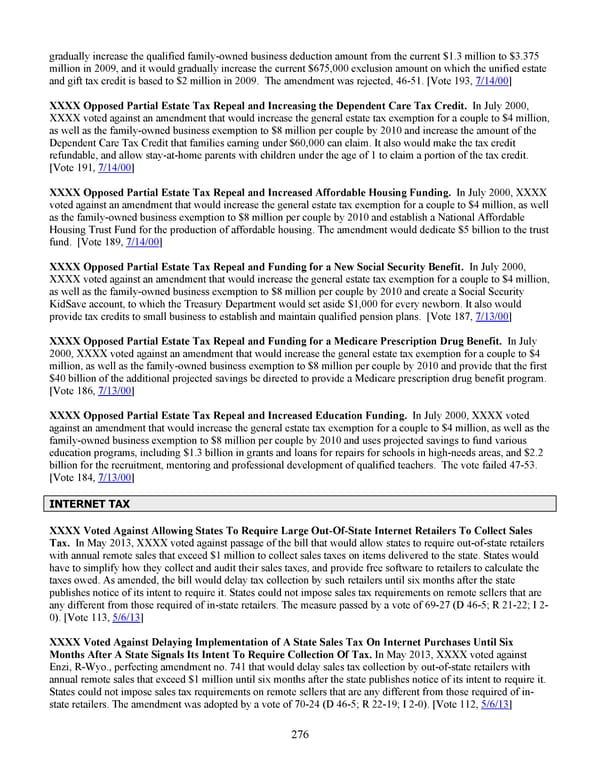gradually increase the qualified family-owned business deduction amount from the current $1.3 million to $3.375 million in 2009, and it would gradually increase the current $675,000 exclusion amount on which the unified estate and gift tax credit is based to $2 million in 2009. The amendment was rejected, 46-51. [Vote 193, 7/14/00] XXXX Opposed Partial Estate Tax Repeal and Increasing the Dependent Care Tax Credit. In July 2000, XXXX voted against an amendment that would increase the general estate tax exemption for a couple to $4 million, as well as the family-owned business exemption to $8 million per couple by 2010 and increase the amount of the Dependent Care Tax Credit that families earning under $60,000 can claim. It also would make the tax credit refundable, and allow stay-at-home parents with children under the age of 1 to claim a portion of the tax credit. [Vote 191, 7/14/00] XXXX Opposed Partial Estate Tax Repeal and Increased Affordable Housing Funding. In July 2000, XXXX voted against an amendment that would increase the general estate tax exemption for a couple to $4 million, as well as the family-owned business exemption to $8 million per couple by 2010 and establish a National Affordable Housing Trust Fund for the production of affordable housing. The amendment would dedicate $5 billion to the trust fund. [Vote 189, 7/14/00] XXXX Opposed Partial Estate Tax Repeal and Funding for a New Social Security Benefit. In July 2000, XXXX voted against an amendment that would increase the general estate tax exemption for a couple to $4 million, as well as the family-owned business exemption to $8 million per couple by 2010 and create a Social Security KidSave account, to which the Treasury Department would set aside $1,000 for every newborn. It also would provide tax credits to small business to establish and maintain qualified pension plans. [Vote 187, 7/13/00] XXXX Opposed Partial Estate Tax Repeal and Funding for a Medicare Prescription Drug Benefit. In July 2000, XXXX voted against an amendment that would increase the general estate tax exemption for a couple to $4 million, as well as the family-owned business exemption to $8 million per couple by 2010 and provide that the first $40 billion of the additional projected savings be directed to provide a Medicare prescription drug benefit program. [Vote 186, 7/13/00] XXXX Opposed Partial Estate Tax Repeal and Increased Education Funding. In July 2000, XXXX voted against an amendment that would increase the general estate tax exemption for a couple to $4 million, as well as the family-owned business exemption to $8 million per couple by 2010 and uses projected savings to fund various education programs, including $1.3 billion in grants and loans for repairs for schools in high-needs areas, and $2.2 billion for the recruitment, mentoring and professional development of qualified teachers. The vote failed 47-53. [Vote 184, 7/13/00] INTERNET TAX XXXX Voted Against Allowing States To Require Large Out-Of-State Internet Retailers To Collect Sales Tax. In May 2013, XXXX voted against passage of the bill that would allow states to require out-of-state retailers with annual remote sales that exceed $1 million to collect sales taxes on items delivered to the state. States would have to simplify how they collect and audit their sales taxes, and provide free software to retailers to calculate the taxes owed. As amended, the bill would delay tax collection by such retailers until six months after the state publishes notice of its intent to require it. States could not impose sales tax requirements on remote sellers that are any different from those required of in-state retailers. The measure passed by a vote of 69-27 (D 46-5; R 21-22; I 2- 0). [Vote 113, 5/6/13] XXXX Voted Against Delaying Implementation of A State Sales Tax On Internet Purchases Until Six Months After A State Signals Its Intent To Require Collection Of Tax. In May 2013, XXXX voted against Enzi, R-Wyo., perfecting amendment no. 741 that would delay sales tax collection by out-of-state retailers with annual remote sales that exceed $1 million until six months after the state publishes notice of its intent to require it. States could not impose sales tax requirements on remote sellers that are any different from those required of in- state retailers. The amendment was adopted by a vote of 70-24 (D 46-5; R 22-19; I 2-0). [Vote 112, 5/6/13] 276
 HRC vote skeleton Page 297 Page 299
HRC vote skeleton Page 297 Page 299